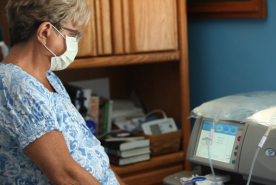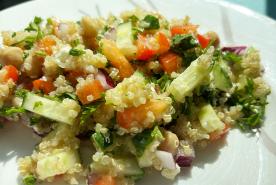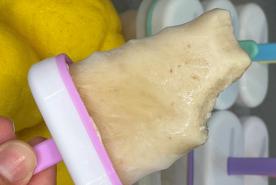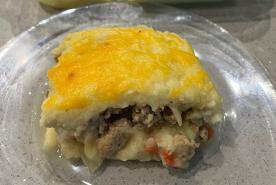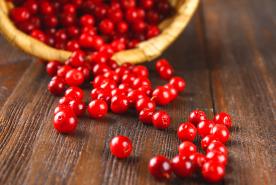As a patient beginning peritoneal dialysis treatments, you are adjusting to many changes in your daily life. Your healthcare professional has probably told you that some changes in your diet will be necessary.
Why will you have to follow a special diet?
Because your kidneys are not able to get rid of enough waste products and fluids from your body.
It is important that you have the right amounts of protein, calories, vitamins and minerals in your diet. Your dietitian will help you plan your meals to make sure that you get the proper balance. Here are some general guidelines:
Protein
Your body needs protein for growth, building muscles and repairing tissue.
After your body uses the protein in the foods you eat, a waste product called urea is left. Since your kidneys are not able to get rid of this urea, you may have too much in your blood. Dialysis and your diet are important to keep the urea level down.
Along with the clearing of urea, your body loses proteins that normally stay in your blood. You will need to eat more protein to replace what is lost. The type of protein you eat is also very important. You should eat high quality protein at each meal. It comes from animal sources such as eggs, fish, chicken and meat. Low quality protein needs to be limited in your diet. It comes from plant sources such as vegetables and grains.
Potassium
Potassium is a mineral found naturally in foods that is dangerous to your heart when you have too much or too little. There is a lot of potassium in dried fruits, dried beans and peas, nuts, meat, milk, fruits and vegetables and also in salt substitutes. Since both high and low levels of potassium in your body are dangerous to your heart, your potassium level will be watched closely by your healthcare team.
Fluid and Sodium
Sodium is a mineral that is found naturally in foods and can affect your blood pressure. It is found in large amounts in fast foods, table salt, canned foods, and processed meats (cold cuts, hot dogs, sausage, bacon).
With peritoneal dialysis, you may be able to follow your usual diet. Watching your sodium can help to control your thirst and your weight gain. It may also lower your use of high-sugar solutions. Your doctor will choose the right dialysate for you to control your blood pressure and fluid level.
Phosphorus
Phosphorus is a mineral present in all foods. It is found in large amounts in milk, cheese, nuts, dried beans and peas.
Eating foods high in phosphorus will raise the phosphorus in your blood and this can cause calcium to be pulled from your bones. This will make your bones weak and cause them to break easily. To help control the phosphorus in your blood, you may need to take medicine called a “phosphate binder”. It should be taken with your meals and snacks as ordered by your healthcare professional. Your kidney dietitian can also tell you about protein foods that are lower in phosphorus.
Vitamins and Minerals
The dialysis treatment washes some water-soluble vitamins out of your body. If you are not getting all the vitamins and minerals you need from the foods you eat, vitamin and mineral supplements may be recommended. It is important to take only what is ordered for you. Certain vitamins and minerals can be harmful to people on dialysis..
Reviewed by the Council on Renal Nutrition: April 2019
If you would like more information, please contact us.
© 2015 National Kidney Foundation. All rights reserved. This material does not constitute medical advice. It is intended for informational purposes only. Please consult a physician for specific treatment recommendations.








